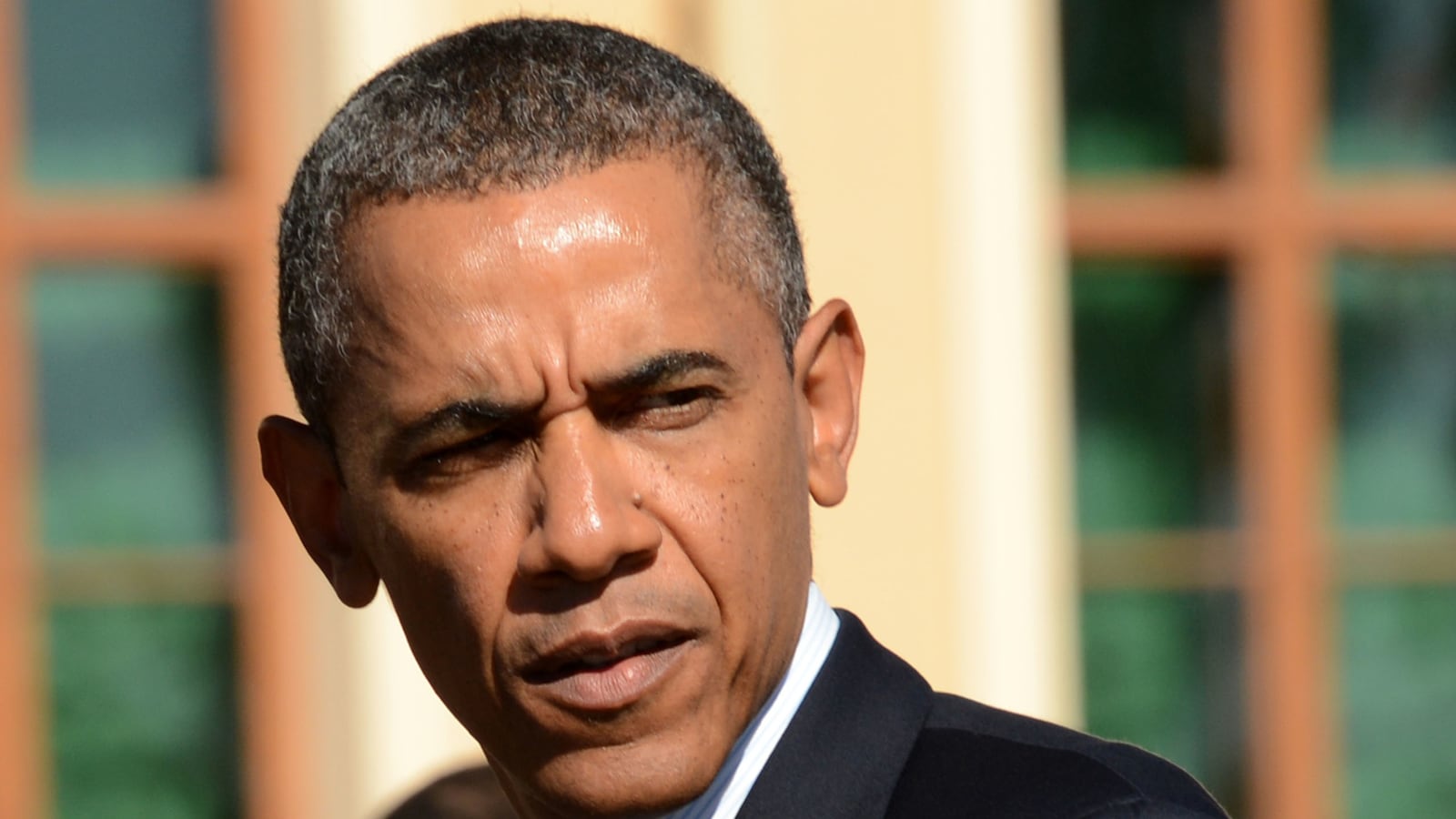Barack Obama is no George H.W. Bush, that’s for sure.
As commander in chief, Bush assembled a significant and successful coalition against Saddam Hussein—a real alliance that signaled to one and all that the world was united against Iraq’s aggression against Kuwait. Egypt and Syria were formal coalition members; even China and Russia were at least nominally on board.

Today President Obama fights an uphill battle to keep his own party in line over merely firing missiles at Syria—never mind Republicans. He simply can’t make a persuasive case for putting American troops in harm’s way. Admittedly, the rationale for the Gulf War was stronger than the motivation for lobbing missiles at the Assad regime. But it’s become increasingly clear that Obama lacks a key weapon that Bush didn’t—a credible member of the congressional opposition to lobby on his behalf. And he can only blame himself for that lack.
Unlike Bush 41, Obama doesn’t have a Steve Solarz in his corner.
Who was the late Stephen J. Solarz? In the run-up to the 1991 Gulf War, the Brooklyn congressman, together with House Minority Leader Bob Michel (R-IL), co-authored the congressional resolution giving the U.S. the green light to wage Operation Desert Storm, the multinational American-led military operation that dislodged Hussein and his army from Kuwait. In early January 1991, Solarz penned a piece in The New Republic titled “The Stakes in the Gulf.” His influential essay combined idealism with realpolitik. As he wrote, “There is, for a start, the question of oil. If Saddam succeeds in incorporating Kuwait into Iraq, he will be in a position to control, by intimidation or invasion, the oil resources of the entire Gulf.”
At the end of the day, 85 Democrats joined Solarz and the House GOP, handing Bush a 250-183 victory. Obama is not even close to that. (See The Daily Beast’s vote tracker here.)
John McCain, Lindsey Graham, and House Speaker John Boehner are not enough. If Obama wants to win this vote, he needs a Solarz.
To be sure, Solarz was no stranger to controversy or heavy lifting. In 1983 the Brooklyn representative argued that congressional approval under the War Powers Act was a prerequisite for a Marine presence in Lebanon. But as early as 1990, Solarz had emerged as a Democratic hawk who had the attention of President Bush, and Bush was able to align himself with Solarz to great effect.

Meanwhile, Obama is constitutionally incapable of doing serious outreach to the House GOP. For the record, he has taunted House Majority Leader Eric Cantor, publicly embarrassed Congressman Paul Ryan, and pulled the rug out from under Boehner.
Democrats, dovish to begin with, are skittish about launching another American adventure in the Middle East, particularly given the U.S.’s dismal record of getting things right in the region. Lebanon, Somalia, Afghanistan, the second Iraq War, and Libya are marked failures, and Obama offers no reason to believe that this time out will be any different. Secretary of State John Kerry’s pronouncement that any attack would be “unbelievably small”—and his suggestion that Assad still has a week to give up his chemical weapons to avoid a U.S. strike—does not inspire confidence.
Put bluntly, Obama’s introverted narcisissm is costing him dearly. He is ill equipped to persuade the country and to earn the trust of the not-so-loyal opposition. He lacks Bush 41’s judgment on war and foreign affairs while being hampered by an inefficient foreign-policy-making apparatus.
To be fair, the cultural gap between Bush 41 and Solarz was much narrower than the chasm between Obama and the Tea Party–centered House. At least Greenwich and Brooklyn both fall along Interstate 95.
Obama’s quest for congressional support is also hobbled by the public’s widespread opposition to the war, a fact Obama now acknowledges. According to a Washington Post–ABC News poll, Americans say no to U.S. involvement in Syria by a 2–1 ratio. Scott Clement of the Post writes, "There is no political or demographic group in which a majority supports military action in Syria." According to a CNN poll, more than 30 percent say they would be more likely to vote for a congressman who opposed the war, while a bare 11 percent would reward a congressman who backed a war resolution. Apparently the only constituencies for war are policy elites, as Peggy Noonan observed, and a few foreign governments. Interestingly, members of Congress who served in Iraq and Afghanistan are strongly opposed to U.S. intervention.
All told, Obama faces a challenge stiffer than passing health care. The public is even more opposed, the House is controlled by the GOP, and there are no goodies to ladle out to large swaths of the electorate. The touted gains of attack are intangible, while its downside is real and grave. Going to war simply to keep a campaign promise doesn’t cut it, and the cry of “Do it for Obama!” is trivially self-referential. When Nancy Pelosi’s discussion with her grandson is offered as a rationale for war, Obama is clearly in trouble. The war in Syria is not of the president’s making. Yet the current imbroglio in which Obama finds himself is self-inflicted. Obama ran a disciplined reelection campaign, but he could have guarded his tongue more carefully. One Joe Biden around the White House is enough.
Obama has burned his bridges, and he can’t seem to find a credible bridge builder because he never cultivated one.






